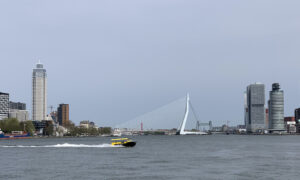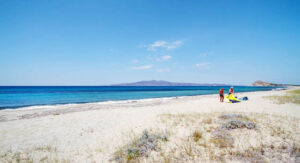There’s nothing more depressing than watching your native country implode. Well, maybe experiencing it first-hand.
My American expat family has been living in the Netherlands now for more than 18 months, returning to Europe after living in Germany and Turkey from 1999 to 2007.
 This time is different.
This time is different.
Before, we always knew we could go home. Now, with the Trump Administration, we feel more like political refugees than economic migrants.
The ascendency of Trump and his embrace of Russia, along with Populists and White Nationalists such as Alex Jones, Steve Bannon and Richard Spenser, has brought into sharp focus the differences between my native country and my adopted country.
That includes two wildly different visions of “freedom.”
In the United States, “freedom” increasingly is defined by the Far Right’s freedom to dictate to Americans what they can and can’t do. They are free to carry guns, indulge in hate speech with impunity and discriminate openly against groups they dislike.
They are also free to go without healthcare, unoppressed by a tyrannical social safety net.
In the Netherlands, people are not free to do any of those things. But they are free to enjoy unfettered access to all the things the Dutch believe make for a stable and productive society including education, healthcare, a social safety net, a safe and secure environment and jobs.
There’s abundant empirical data to mark the progress, or lack of, of both courses.
The much touted American Middle Class is shrinking while polarization increases. Culture wars increasingly divide the nation into Red and Blue, urban and rural, rich and poor, religious and secular, immigrant and nativist, tolerant and intolerant and literally black and white.
If I had to identify one essential difference between the U.S. and the Netherlands, it’s that the Netherlands has kept what America has lost: Societal cohesion. An overall agreement on social norms.
Unity.
Sure, there’s plenty of political friction here especially when it comes to migrants. But on the practical level, even the Far Right in the Netherlands embraces things Rush Limbaugh Americans despise … entitlement programs, gun control, women’s rights, LGBT rights, affordable education and infrastructure spending.
In fact, Far Right politician Geert Wilders, who wants to deport all Muslims, close the mosques and stop immigration, can be fairly liberal on social issues and uses the intolerant aspects of Islam to justify his extremist rhetoric.
Wilders and the late Pym Fortune argued the problem with immigrants isn’t so much their foreignness as it is in the U.S. It’s that they are intolerant.
Because the Netherlands has a byzantine proportional representation electoral system with 20-plus political parties, Wilders’ Freedom Party can’t get much traction because none of the other parties will work with them.
Bottom line: Tolerance still defines the Netherlands, a tolerance that starts with civility on a personal level and extends to the national zeitgeist.
If you’re thinking about coming here to work or just escape the Trump madness, here are the major differences I’ve noticed after living here 18 months.
Shared burden vs. go it alone

YOU DON’T GET ADVANCED RAIL SERVICE WITHOUT SOMEONE PAYING TAXES
• In the Netherlands, the national consensus is the better educated and healthier Dutch people are, the more competitive the country is in global terms. So taxes are relatively high to fund universal healthcare and schools.
The government funds mass transportation and infrastructure expansion and maintenance. Unlike in the U.S., Dutch subways, streets, national highways and utilities are in excellent shape. For mostly cultural reasons, the system here is more efficient and less corrrupt than in the U.S.
• In the U.S., it’s hard to believe President Eisenhower once united the nation behind raising billions in taxes to build a national interstate highway network!
Now, the prevailing attitude is that taxes are bad. All taxes. The MAGA crowd is unanimous on one point: “I don’t want to pay for any services that don’t benefit me directly.” We have friends in The States who argue they shouldn’t have to pay school taxes because they don’t have children in the system. In the Netherlands, the thinking is that everyone benefits from having a highly educated workforce.
Universal healthcare? That’s Communism. Americans pull themselves up by the bootstraps. Which, I’m pretty sure is physically impossible. It’s so bad there’s an increase in mothers dying in childbirth, along with rising infant mortality, because fewer and fewer Americans have decent health insurance or access to affordable healthcare.
Middle Class vs. the One Percent
 • In the U.S., it’s never been clearer how there is a conscious decision by policymakers to shrink the middle class in order to bolster the One Percent.
• In the U.S., it’s never been clearer how there is a conscious decision by policymakers to shrink the middle class in order to bolster the One Percent.
The current GOP tax cut proposal is really less cutting than shifting the tax burden onto the lower-middle class and poor. A change in the tax code with punitive provisions for women and the working poor.
No other nation in the 35-member Organization for Economic Cooperation and Development has as unequal wealth distribution as the U.S., and none has experienced such a sharp rise in inequality, according to a recent New York Times post, “Myths of the 1 Percent; What Puts People at the Top.”
Now, less than 50 percent of Americans fall into the middle class as the median household income decreases. According to a recent report by Pew Research Center, the U.S. has not only the smallest share of adults living in middle-income households among OECD countries, but also the largest shares of adults in lower- and upper-income households.
So, since World War II, the U.S. has gone from a country where most people considered themselves middle class to a country with a Third World wealth distribution profile.
• In the Netherlands, about 80 percent of citizens are classified as “middle class … and that percentage is actually increasing. Again according to Pew’s research, the Netherlands is one of the OECD countries, along with France and the United Kingdom, where shares of adults in the middle-income ranking are increasing as citizens move out of the ranks of the poor.
Guns
• In the U.S., the National Rifle Association literally sends out its lobbyists to write bills for state legislatures. The result is, access to all firearms including assault rifles is unchecked except in Blue States such as California, Massachusetts, and Connecticut. And of course, the number of gun homicides and mass shootings across America is increasing every year in every major city.
• Access to guns in the Netherlands is tightly controlled. There are only two reasons to own a gun here – hunting or sport. Forget about owning an automatic anything. Local farmers tell me to get the right to use a hunting rifle or shotgun, applicants have to apply to a club. Members size up the applicant while he or she goes through a 1-year course with a tough test at the end. As a result, there are fewer gun homicides in the Netherlands, population 17 million, than in my hometown of Louisville, Ky., population 1.3 million.
Religion
• This is probably the biggest difference between the two countries. In the U.S. Evangelicals have become the most disciplined and active force in American politics. And, through focus and funding, the most powerful. That trend will only strengthen as Trump appears ready to exempt churches from laws restricting their political activities.
• The Netherlands, like most of Europe, is irreligious. That said, there is a growing evangelical movement in conservative regions such as Limburg, but it’s tiny by comparison to the U.S.
Immigration
 • Geert Wilders aside, Dutch economic policy is focused on attracting highly skilled internationals because demographics are eroding the workforce here. New research shows the Netherlands can expect to create more than 500,000 new jobs during the next six years.
• Geert Wilders aside, Dutch economic policy is focused on attracting highly skilled internationals because demographics are eroding the workforce here. New research shows the Netherlands can expect to create more than 500,000 new jobs during the next six years.
Great, right?
The problem is, the Netherlands has a rapidly aging demographic, with more people retiring than entering the workforce. There is projected to be 1.2 million people to fill 1.6 million job openings by 2020.
• In the U.S., the borders are now closed by fiat to a defined group of countries with Muslim majority populations. There are de facto bans now against non-Europeans as the U.S. has sharply curtailed H1B visas and other programs for highly skilled internationals.
I could list another dozen categories including Global Warming, recycling and the environment. But you get the idea.
All this is harder to comprehend because we – the Dutch and the Americans – started at the same place with common histories, cultures and customs. But during the last few years, the countries have diverged profoundly in the way they see the world.
In the U.S., the sentiment is to, as William F. Buckley so famously said, “stand athwart history yelling, ‘Stop.’ ”
In the Netherlands, the Dutch can’t race to the future fast enough.
Co-CEO of Dispatches Europe. A former military reporter, I'm a serial expat who has lived in France, Turkey, Germany and the Netherlands.















